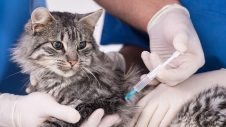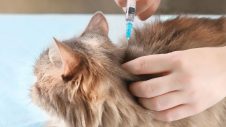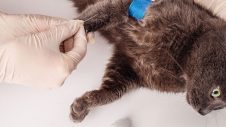Feline AIDS is caused by infection with feline immunodeficiency virus (FIV). This viral disease interferes with the immune system of the infected cat and is is potentially fatal.
FIV is NOT the same virus as human immunodeficiency virus (HIV), which causes Human AIDs. Even though FIV is related to HIV no human has ever been reported to be infected with FIV.
FIV is spread mostly by biting but can also be transmitted by a mother cat to her kittens across the placenta or through her milk. It is reported that between 14% and 29% of cats in Australia and New Zealand test positive for FIV. Outdoor cats are at the highest risk of disease, especially if they fight with other cats.
After infection there is a period of variable length during which the virus lives in the cat’s body but may not cause the cat to become unwell. The average length of time between becoming infected and the start of symptoms related to the virus is 7 years but may be as long as 10 years, or as little as less than a year.
Many infected cats will initially show no sign of being infected with FIV but some will show some initial symptoms such as;
- Fever
- Loss of appetite
- Diarrhoea
- Lethargy
- Swollen lymph nodes
Generally these symptoms will resolve and the cat will appear healthy for a period of time before starting to show other symptoms of the disease as it progresses.
Many of the symptoms shown by cats with FIV are due to the immune suppression caused by the disease rather than as a direct effect of the virus itself.
Symptoms which may occur are;
- Dental problems and inflamed gums
- Weight loss
- Some forms of cancer are more common in FIV infected cats (lymphoma, carcinomas and sarcomas)
- Loss of appetite
- Depression
- Infections of organ systems related to the immune suppression caused by the virus (respiratory, urinary tract, gastrointestinal, etc)
- Diarrhoea
- Anaemia (low numbers of red blood cells)
- Low numbers of other cells including white blood cells and platelets
- Swollen lymph nodes
- Kidney infections or failure
- Behavioural abnormalities (dementia, hiding, roaming, rage, inappropriate urination and defaecation)
- Inflammation of the eye
As the disease progresses the cat’s immune system becomes too weak to fight off other infections or disease and as a result, the cat will usually eventually die from one of these subsequent infections.
A blood test can tell us if the cat as been exposed to the virus from 60 days after the cat is first infected. We will normally do this screening test in our clinic laboratory and if the result is positive we would then send a second sample to an external laboratory for confirmation.
Kittens can be tested for FIV but sometimes the antibodies they receive in their mother’s milk can interfere with the test and can cause a false result. If kittens do test positive then they should be retested once they have reached 6 months of age to make sure that the positive test result was correct.
Unfortunately there has been no successful treatment found for FIV infection. All we can do is stay alert for the early signs of disease and treat any infections and problems that develop as they arise.
FIV positive cats should be kept indoors both to limit their exposure to infections and to prevent spread of the infection to other cats. Any other cats in the household, if tested negative for FIV, can be vaccinated to try and prevent them from also becoming infected. However, as the virus is mostly spread by biting, if your cats live peacefully together and do not fight they are not likely to infect each other.
If your cats do not have FIV then there are a number of ways in which we can try to prevent infection;
- Keeping your cat indoors and limiting exposure to other cats
- If you are introducing a new cat to your house then it is best to test the new cat for FIV first.
- If your cat has best tested and is negative for FIV then he or she can be vaccinated against the disease.
The FIV vaccination consists of an initial course of 3 vaccinations 2-4wks apart, then a yearly booster. The vaccination has been shown to protect 82% of cats vaccinated.
Cats must be tested for FIV first and must be negative in order for them to be vaccinated.
We strongly recommend that all cats which are vaccinated also get a microchip inserted at the time of their first vaccination if they are not already microchipped. This is because once a cat has been vaccinated against FIV they will show up positive on the tests for FIV. This happens because the tests for FIV pick up antibodies to the virus in the cat’s blood. The production of antibodies is how the cat’s body reacts to both the vaccination and the virus. The positive FIV test result in vaccinated cats does not mean that they have Feline AIDs, it just shows that they have produced antibodies to protect against the virus. At a lot of animal shelters, pounds etc cats are tested for FIV and if positive may be put to sleep. If cats are microchipped this should avoid any testing and putting to sleep of cats which are mistakenly believed to be infected with FIV because they have been vaccinated.

 Greencross Vets
Greencross Vets 









